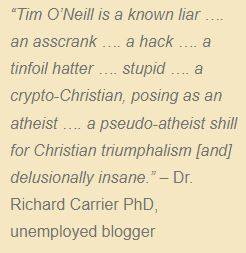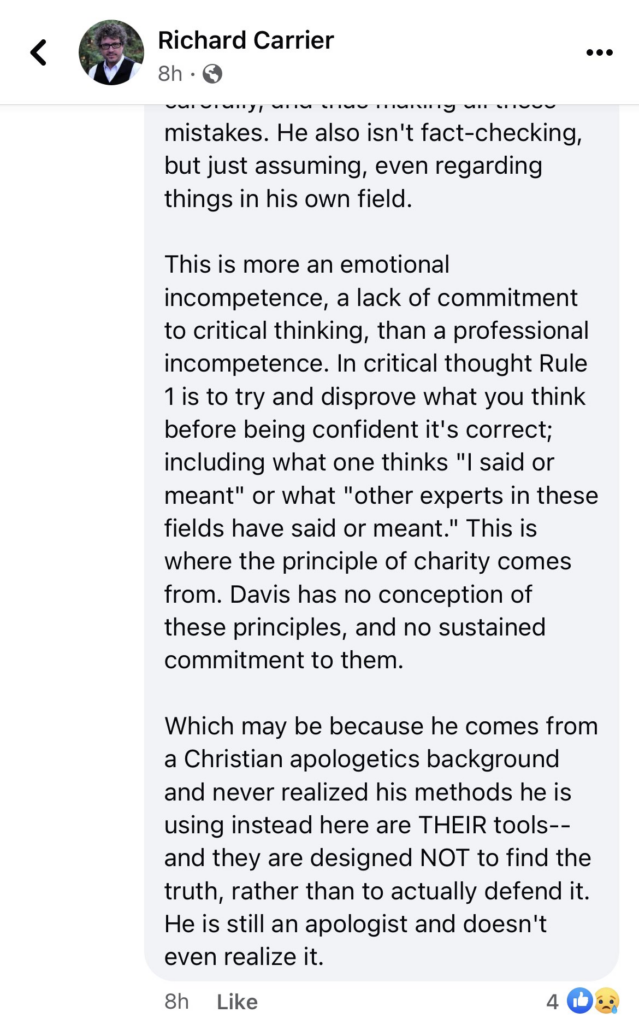The Argument from John the Baptist: This conflation of hypothesis with fact, enduring because of a failure to check, is also exhibited by Francesca Stavrakopoulou when she was asked why she still thought Jesus existed (although her confidence in that conclusion, she has admitted,
is not that strong): she gave the stock reason that the Gospels’ inclusion of Jesus being baptized by John seems too embarrassing to have been made up, and so they appear to have been forced to admit it only by its being well known. This is a common argument. Yet it’s a perfect example of a claim that is believed because it keeps getting repeated, but no one actually checks if it’s even true—or else, when they do check, they find that it is not, as John Gager did in “
The Gospels and Jesus: Some Doubts about Method,”
Journal of Religion 54.3 (July 1974), pp. 262–63.
Almost everything about this claim is false, even its logic (
Proving History, pp. 145–48). The Gospel authors had no trouble leaving things out they didn’t like; so the idea that they were “forced” to include it is simply false. And the whole idea of it appears invented by Mark, who, far from being embarrassed by it, found it incredibly (indeed quite suspiciously) convenient: the famous Baptist, in the role of the scripturally required Elijah, openly endorsing Christ as his superior and successor! That’s the kind of story
you make up. Not the kind you want to avoid. Only in
later decades were theological problems with this story raised, evincing concerns
explicitly rejected by Mark (Ibid.).
Stavrakopoulou at least pointed to a different detail as more telling for her than the baptism itself: the story (originating in Matthew, not Mark) that Disciples of John came questioning Jesus, suggesting some sort of historical tension between them. But when you read the
whole story (
Matthew 11:1-15) that isn’t what it indicates, but quite the contrary: it is a story attempting to claim
endorsement by John’s men, by inventing them asking about it and being satisfied; Jesus is then given a speech praising John and establishing him as a prophet endorsing Jesus! Think about this. You know everyone loves the late Carl Sagan. So you tell a tale wherein Sagan sends his friends to ask you if you are the best caretaker of his legacy, and you say yes, and his friends don’t contest it, while you then boast how awesome Sagan is and therefore how authoritative it is that he endorsed you! This isn’t evincing tension. It sounds more like something you quite conveniently faked. The idea that it evinces “tension” is a hypothesis, not a fact; and it’s a hypothesis that actually strains against the evidence, rather than being established by it. But once a dubious hypothesis becomes “fact,” and gets repeated over and over, and no one checks, you end up with mythical reasons to believe in the historicity of Jesus—just like this.
[...]
The Argument from Apostles Before Him: Probably every historicist has tried this in some form or other, but a recent example is when Robyn Faith Walsh
gives her reason to think Jesus existed:
…Because what Paul provides is a story of Christ, because he never knew Jesus. He rarely tells us anything about the historical Jesus. He doesn’t really care. He gets no authority from that. [But] you know, he tells us that Peter and James are still around. Those guys get authority from having known the historical Jesus, but they didn’t write anything down. Paul did. And you know he’s authorized because he has the most recent intel, he’s talked to the risen Christ and so that’s what he emphasizes.
She also argues that Paul mentions a “Last Supper,” which isn’t true. He only appears to reference a vision (he says “the Lord” told him about it directly, the word “last” is never there, and only Jesus is present in the scene he relates), similar to the vision of a meal
Acts reports for Peter. That’s another example of something that, when you check, it falls apart (see my discussion in
Mark’s Use of Paul’s Epistles and
What’s Up with 1 Corinthians 11:23?, and the corroboration of my conclusion in
the findings of Beverly Roberts Gaventa and Francis Watson).
But let’s focus on this common fallacy of assuming prior
Apostles means
Disciples. Is there any evidence in Paul that “those guys get authority from having known the historical Jesus”? No. To the contrary, that conundrum is conspicuously
absent from the letters of Paul: that they knew Jesus and he didn’t is never an argument he ever has to face or rebut. As far as Paul appears to know, the first time Peter and gang ever saw Jesus was
after Jesus died, and they only knew he died
from scripture (this is, after all, literally what
1 Corinthians 15:3-5 says; but see my survey of all the evidence in
OHJ, Chapter 11.2, 11.4, and 11.8). There is a reason Paul has never heard of anyone being a “disciple” of Jesus, and why he keeps assuming “apostle” simply meant someone receiving a vision of Jesus (
1 Corinthians 9, where there is no notion of any other way to see Jesus;
Romans 10:12-16, where the Greek makes clear he is talking about apostles; and so on). Paul also never argues that he has any greater authority because he spoke to Jesus “most recently.” That’s a hypothesis, not a fact. And it’s not a good hypothesis, either. When you check, that notion simply doesn’t hold up; rather, quite the opposite: in
Galatians 1 Paul makes clear the
only respectable way to have really seen Jesus was by vision (
OHJ, pp. 524–27, 536, 553–54). Yes, the idea that Paul was in some sort of contest with the Disciples over their having been hand-picked before Jesus died is a notion repeated over and over again in the field.
But when you check, it falls apart. It’s not in Paul. So, this is a common reason given to believe in historicity.
But it’s a really bad reason.
Walsh also says she
finds it hard to believe that they all (Peter and Paul and the lot) made up a historical Jesus. Which is another argument I have heard before; and it reflects, point blank, the phenomenon of not checking. If she would check, she would find out that I and Lataster—the authors of the only legitimate studies finding historicity doubtful—agree with her on this. I even included it as a theory I ruled out as having too small a probability to credit (
OHJ, pp. 53–55). The only alternative to historicity that I found has any chance of being more likely is that
Mark (or someone of his generation) “made up” what we mean by a historical Jesus, not Paul or any of the first Apostles. In their generation, no one had come up with any such idea yet; that’s why it is so bizarrely absent from all pre-War Christian literature (all of Paul; 1 Clement; Hebrews; even James, Jude, and 1 Peter
if you categorize them that early). In their day, they were talking about a celestial event (an incarnation, death, and resurrection) that they only knew happened by revelation (and “secret messages” in scripture). Yes,
they thought that was a historical event, just as they thought Satan’s war in heaven was a historical event. But we know better.
And they might not have been making any of that up. They might have sincerely believed it all (the anthropology of religion affords countless parallels:
OHJ, Ch. 4, Element 15). They might also have made it up (that’s a lot easier to do; it also has countless precedents in the anthropology of religion, as I survey in Ch. 10 of
Not the Impossible Faith, though Mormonism and Islam come to mind as oft-cited examples). It might also have been a little of both. But the bottom line is, going around claiming a celestial being visited them in a dream or waking vision, conveying secret information, is something we know to be quite plausible, because it happened a lot back then, and since. And in respect to the
resurrection of Jesus, Walsh would concede that is what
did happen. All we are saying is that this same circumstance just as easily accounts for
both Jesuses: pre-mortem
and post-mortem (see
my Analogy in Resurrection Apologetics). Walsh is evidently unaware of this, our actual theory. And consequently, because she remains stuck on an implausible theory, she remains convinced of historicity. Imagine what will happen when she discovers this assumption of hers is false? When she finds out peer-reviewed mythicism argues something
other than what she has been assuming? Will she update her conclusion, now that its premise is eliminated, or will she try to come up with something else to defend the dogma by?
Conclusion
This is the most common reason the consensus on Jesus is useless: it is based on false assumptions about what the alternative even is, much less the evidence for it; and, as we’ve seen, it is based on a series of ancillary dogmas that turn out to be false when checked.
It is thus based entirely on not checking (or not admitting to the results once checked). Which is all indicative of a malformed consensus, which cannot be used as an argument—it is, rather, its own refutation (see, again,
On Evaluating Arguments from Consensus).
Only scholars who have checked all these things have relevant opinions. Everyone else literally does not know what they are talking about. Sometimes intentionally. Sometimes owing to bad practices inculcated in their training. Sometimes due to laziness or disinterest. But regardless of the why, the what remains: the ignorant are not relevant authorities.
Citing such scholars on this matter is therefore a textbook example of the fallacy of
Argument from Authority. If they haven’t checked, they can’t know. And if they can’t know, their being mere “experts” in the field is of no relevance. Appealing to them would be like appealing to a forensics expert who hasn’t reviewed the evidence specific to the case you are seeking their opinion on. Yeah, they are an expert. But even experts are not psychics. If they didn’t even look at the arguments and evidence in that specific matter, if they don’t even know what they are, they can’t honestly know their merits, can they? Their opinion on it is therefore worthless. Only after they inform themselves will their opinion matter—and that means only when they
check, and that means check it all: what the only credible alternative to historicity actually is, what evidence it actually appeals to, and the merits of every knee-jerk ancillary dogma resorted to in any effort to deny it. Because I can tell you, every “But surely
x” argument for historicity falls apart when checked.
And that should tell us something.
And that’s the bottom line. Notice just from this article alone how many
bad arguments for historicity occupy the field. This is why the field remains stuck on the dogma of historicity: they don’t even know these are bad arguments.
Because they aren’t checking.
--Carrier (10 October 2023).
"Things Fall Apart Only When You Check: The Main Reason the Historicity of Jesus Continues to Be Believed".
Richard Carrier Blogs.




